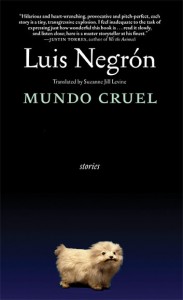 The Rest of Us
The Rest of Us
by Guy Mark Foster
Tincture/Lethe Press. 180 pages, $15.
 Mundo Cruel
Mundo Cruel
by Luis Negrón (translated by Suzanne Jill Levine)
Seven Stories Press. 96 pages, $13.95
TWO recently published short story collections—one written by an African-American professor, the other by a Puerto Rican author—provide unique perspectives into the lives of queer minorities in the United States.
Guy Mark Foster, who teaches English at Bowdoin College in southern Maine, offers seventeen well-crafted pieces in The Rest of Us, analyzing with a sharp eye and a controlled style the broken lives of black characters struggling with issues of identity in a country marked by racial tension and homophobia. Foster does not avoid controversial topics, tackling head on issues such as interracial relationships in the gay community, abuse within black families, and the AIDS epidemic. The opening story, “Boy,” is a scathing portrayal of abuse as a father gives a series of commands to his son: “bend way the fuck over to better take a stiff one up the ass; this is how a black man takes a stiff one up the ass; this is how a black man takes a stiff one up the ass from a white man—watch me.” In “A Type of Vampirism,” Bernard, the narrator, struggles with his choice of a white lover as he lusts after the black character Calvin, “that young tribesman sent to deliver me back after all.” This motif is revisited in “Between Us,” in which a character named Mark writes a letter to “M” explaining that, despite their intense love, they could not remain together, because, as a white person, M could not provide the “safety” a black lover could.
Together, these stories demonstrate that interracial lovers struggle with the same stigma as other same-sex relationships with the added complication of racism as embedded in American history and culture. Foster handles these issues with frankness in a highly literate style, referencing respected authors from Henry James to James Baldwin. At the other end of the spectrum, Luis Negrón’s vignettes are written in a style that’s more akin to that of Manuel Puig, the Argentine gay author. The stories in Mundo Cruel are irresistibly funny, laced with campy satire. They’re set mostly in Santurce, one of San Juan’s neighborhoods representing a melting pot of sorts: “Blocks and blocks full of doctor’s offices and temples. … Reggaeton, old school salsa, boleros, bachatas, jukeboxes, pool halls, slot machines. Topless bars, Dominican bars, gay bars. Catholic schools, beauty schools, vocational schools, and schools where you get a professional degree in just one year without much homework.” The tales recount the picaresque lives of marginal characters—transsexuals, hustlers, criminals. Negrón’s experimental constructions serve as acerbic critiques of a “machista” culture that condemns same-sex desire while engaging actively in “illicit” sex acts. In the opening story, “The Chosen,” a beautiful evangelical boy, certain “of being anointed,” becomes the focal point of men’s desire, including the preacher who baptizes him: “I saw through his white pants how inside his white cotton jockey shorts, he grew large. … He couldn’t wait until we got to a motel: he made me touch him on the way there. I caressed it and looked at it.” The Spanish version of the stories are distinguished by a Puerto Rican turn of language: Negrón plays with a very colloquial register, exploiting effectively the hybrid Spanglish and slang typical of Puerto Rican Spanish to underscore the popular nature of the stories. To a Puerto Rican reader, these are unmistakably Puerto Rican stories. From the northern fringes of New England to the margins of the American empire, these stories, as different as they are, paint a painful picture of the “cruel world” inhabited by those who are doubly marginalized within their communities. Negrón imagines an end of homophobia in the last story of his collection, aptly named “Mundo Cruel.” Two fabulous gay guys, José A. and Pachi, wake up to discover that homophobia has come to an end. Ironically, this outcome backfires, as the world becomes humdrum for the two characters, whose uniqueness gets subsumed by normalcy: Pachi “saw a policeman in drag and not a single person seemed bothered. He saw a couple of young boys holding hands and nobody took the slightest notice. He was overcome by panic.” Though rendered satirically, this horizon of tolerance is posited as a final good-bye to this cruel world. Eduardo A. Febles is the author of Labyrinths of Lust, published by JMS Books.





